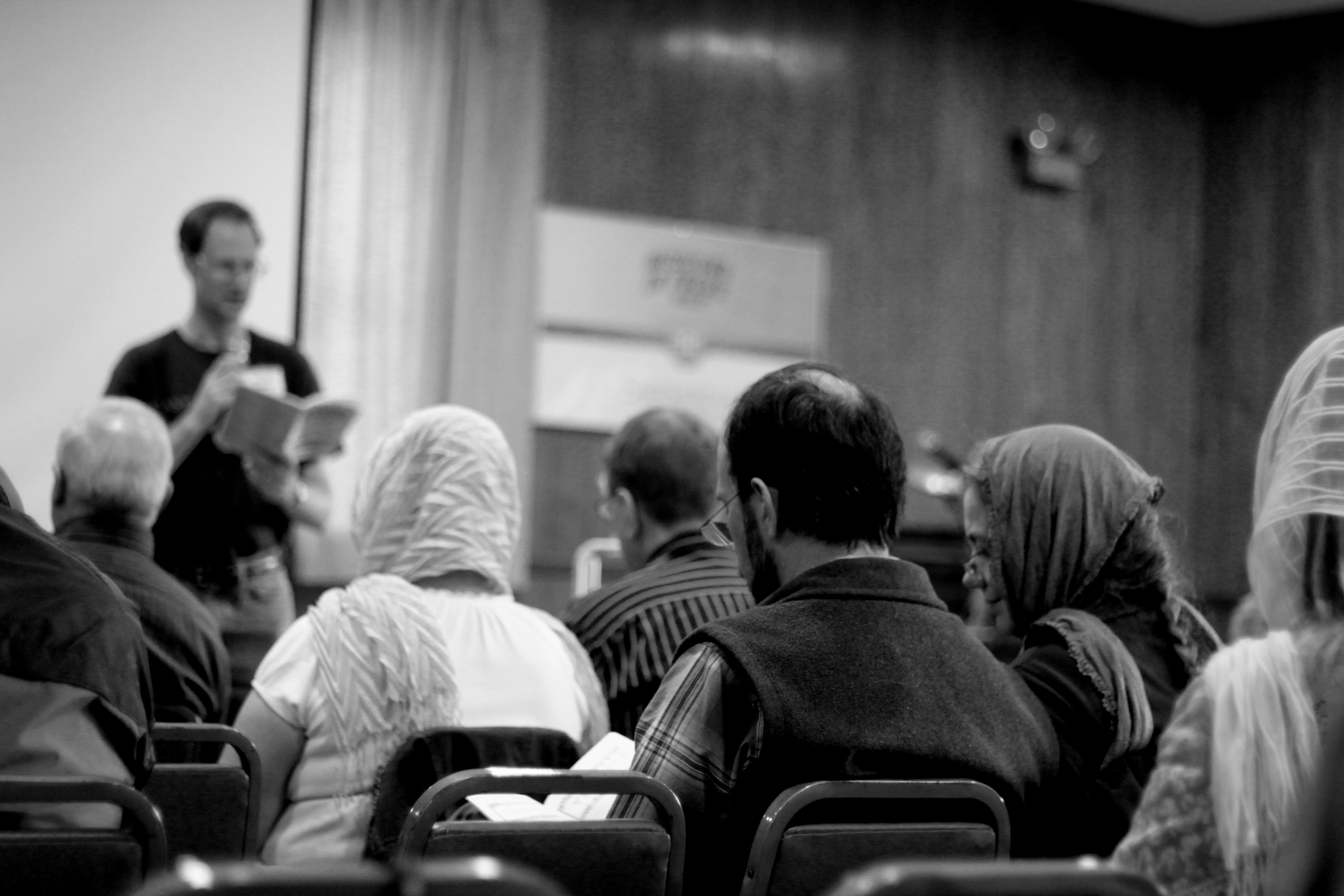The Church - Part 1

The words "church" and "churches" are mentioned some 120 times in the New Testament, and the same original word, meaning "a calling out" is used. (The only exception is in Acts 19:37 where the expression "Robbers of churches" is a compound word in the Greek.) Quite obviously the subject is one of great interest to the Inditer of the New Testament - the Holy Spirit of God, as also to the men He has used to write the book.
Careful attention to the Scriptures should leave the honest searcher in no doubt at all as to the divine thought of the Church (or "assembly") and yet in the minds of men there exists all kinds of erroneous ideas as to this immensely important and precious matter. The following comments will be well known to and appreciated by many, but we do well to follow Peter’s example in seeking to "stir up…pure minds by way of remembrance."
The first Scripture to which we would call attention is in Matthew 16:18, where the Lord, speaking to Peter as to his confession regarding the Person of Christ, says "Upon this rock will I build my church; and the gates of hell shall not prevail against it." Now it is important to notice the context in which this incident is set. The Lord had warned His disciples to "Take heed and beware of the leaven of the Pharisees and of the Sadducees" (v. 6). The Scriptures throughout speak of Christ, the pre-eminence of His Person and the value of His work. The Pharisees, whilst believing the Scriptures up to a point, refused to recognize the glory and greatness of the One of whom they speak; whereas the Sadducees, who denied the resurrection (Matthew 22:29) had no knowledge of the "living God."
Before we can have a right conception of the Church we must be delivered from the conjecture and supposition referred to in the following verses (13-14), and have a clear view of the greatness of the Person of Christ and that which God has established as the result of His death and rising again. Whilst at that moment the resurrection was future, and Peter and the other disciples were slow to understand what the Lord said to them regarding it, nevertheless the truth of it is implicit in Peter’s reply to the Lord’s question, "But whom say ye that I am?" "Thou art the Christ, the Son of the living God."
It is a most blessed and important matter to see that the first mention of the Church stands connected with the thought of what is living. This implies the fact of the resurrection, a sphere which is beyond the conception of the mind of man, and the appreciation of which is dependent upon the revelation of diving Persons. The revelation by the Father to Peter as to the "Son of power…by the resurrection from the dead" (or "by resurrection of the dead") (Romans 1:4). It is in resurrection that the "gates of hell" (the kingdom of Satan) are robbed of their power, the enemy’s stronghold stormed and left defeated. To quote another, "That then, which God founds upon this rock of the unchangeable power of life in His Son shall not be overthrown by the kingdom of death" (J.N.D.).
We should notice two further points in the Lord’s remarks to Peter. Verse 18 reads in the New Translation, "And I also, I say unto thee." This is a magnificent assertion of the deity of Christ! Who but a divine Person Himself could, in referring to what God the Father had said, add "I also say." Hence we see that the Church is not built by human hands, it is the work of One who in His Person is "over all, God blessed for ever" (Romans 9:5).
Then we read "I will build My Church." There is something very precious about these oft-quoted words. The Church is not only that which Christ Himself builds, but it is His. We may see in a future article how exceedingly precious His Church is to His own heart. Let us revel in the blessed knowledge that we, through infinite mercy, are part of that wonderful living organism which Christ calls "My Church."
Notice that He says "I will build." He does not say, "I have built," or "I am building." Whilst during His pathway here in this world Christ drew to Him by the words of infinite compassion persons who would form part of His Church, yet He did not build the Church when here. The work which he so fully and blessedly completed at Calvary, and His glorious resurrection and ascension to the right hand of God were all in view of the coming of the Holy Spirit at Pentecost. It was then, and not until then, that the Church was established. It is of the utmost importance to see this. The Church is not found in the Old Testament. (The reference in Acts is to a peculiar people to Himself.) Neither is the Church an addition for, or a continuation of Judaism, it is something completely new, the truth of which was "kept secret" (Romans 16:25) and awaited the Spirit’s day for its revelation, a ministry given particularly, but not exclusively (Ephesians 3:5), to Paul.
In a future word we hope to show the way in which Scripture distinguishes between that which is built by diving Persons in relation to the Church and that which men have built.
The church has an immense value in the minds of divine Persons, a brief consideration of which truth should serve to give it a large place in our own affections. In Acts, chapter 20:28 we read, "the assembly of God, which He has purchased with the blood of His Own". The reference to "all the flock", and the instruction "to feed (or shepherd) the church of God", would suggest that the personnel rather than the church as a vessel are in view. Other Scriptures, to which reference may be made later, clearly refer to the church as a vessel. How blessed it is to realize that every member of this august company has been "purchased" at such cost; what infinite value is thus placed upon each one by God Himself? The deep interest of the whole Godhead is apparent in that one verse of Scripture and the transaction referred to is one which has glorified God in a most wonderful way. We understand that the verb (the "dong" word) "purchased" is one that causes the glory of what is done to reflect upon the doer that is upon God Himself.
The glory of the whole transaction is His, but the consideration of this would give to us a greater understanding of the value of each individual saint to God.
O mind divine, so must it be, That glory all belongs to God;
O love divine, that did decree, We should be part, through Jesus blood.
The church is infinitely precious to Christ. Whilst the parables spoken by the Lord as recorded in Matthew, chapter 13, have the "kingdom of heaven" in mind, the thought of the church as precious to Christ underlies verses 45 and 46. The New Translation gives verse 46 as "one pearl of great value". The world around us price oftimes has but little reference to intrinsic value, but the Scriptures reveal the intimate link between the "great price" which the sufferings of Calvary involved, and the "great value" of the church to Christ. The truth of this is most blessedly seen in Ephesians, chapter 5, "Christ also love the assembly, and has delivered Himself up for it, in order that He might sanctify it, purifying it by the washing of water by the word, that He might present the assembly to Himself glorious, having no spot, or wrinkle, or any such things; but that it might be holy and blameless". How much is involved in those verses! He gave Himself; He sanctifies; He will present her to Himself. Love, eternal love, is seen in every moment; love that surrendered all; love that has continued its unceasing, unaltered service of devotion; love that will be completely satisfied in having secured its object for its own delight, entirely suited to the presence of God, and in absolute accord with His eternal thoughts. "According as He (God) has chosen us in Him before the world’s foundation, that we should be holy and blameless before Him in love". That is the thought of God from eternity, and the result of Christ’s movements in devoted love is that the church is secured in complete correspondence to the mind of God, "glorious… and holy and blameless". Thus the Lord secures an object for the joy of His own heart eternally, and that, too, which fully meets the thoughts and desires of the blessed God. How precious the church is to Christ?
With what delight the Holy Scripture indited those verses in Ephesians 5. The Scriptures had recorded the presentation of Eve to Adam in the beginning of man’s history; a wonderful moment for Adam, and indeed for Eve too. Alas! The subsequent history is well known to us all. The securing of the church for the heart of Christ is something which will abide throughout time and eternity. Eve, as the result of divine workmanship, was peculiarly suitable to Adam in every way, and throughout eternity the church, in holy nearness to Christ will be the joy and satisfaction of His own heart and in Christ and His church will be displayed in a coming day the consummation of God’s eternal purpose.
As we thus consider the value of the church to divine Persons, may the Holy Spirit of God impress upon our hearts the wonder and perfection of God’s eternal thoughts, and cause us to abound in thanksgiving that, as the result of the precious, sacrificial love of Christ, we have an eternal part in that which divine love has secured for its own joy and glory.





